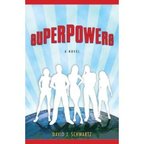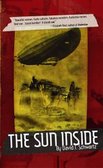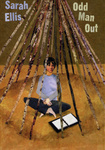SBBT Stop: David J. Schwartz
 David J. Schwartz — henceforth known as "Dave" — is a most excellent human being. Trust me. In addition to that, Dave’s great at karaoke. I know, what more can someone be good at? That’s all you need, right? You want to befriend this man and fix him up with Neko Case, stat. Who doesn’t? AND he’s an amazing writer. For years, he’s been publishing short stories that can’t all be described with the same words, but you’d like them. And now, his first novel, Superpowers, is on the brink of publication. It’s good–really good. About a handful of tenants in the same building who drink some strong home brew one night and wake up with, well, super powers. The sale note billed it as "Kavalier and Clay meets The Incredibles." But I’ll let him tell you about it before it’s all over the airwaves. Suffice to say: Plan on reading this one.
David J. Schwartz — henceforth known as "Dave" — is a most excellent human being. Trust me. In addition to that, Dave’s great at karaoke. I know, what more can someone be good at? That’s all you need, right? You want to befriend this man and fix him up with Neko Case, stat. Who doesn’t? AND he’s an amazing writer. For years, he’s been publishing short stories that can’t all be described with the same words, but you’d like them. And now, his first novel, Superpowers, is on the brink of publication. It’s good–really good. About a handful of tenants in the same building who drink some strong home brew one night and wake up with, well, super powers. The sale note billed it as "Kavalier and Clay meets The Incredibles." But I’ll let him tell you about it before it’s all over the airwaves. Suffice to say: Plan on reading this one.
GB: You know the process porn drill. Tell me about the actual writing of the book — how long it took, what you learned writing it, all that good stuff.
DS: Most of the book — the first three-quarters or so — was written in early 2002. I was bartending at the time (some people prefer to call it "tending bar"), and I’d get home at 2 in the morning, grab something to eat, and write until 5 or 6. I was probably the most disciplined I’ve ever been about my writing. (It helps not to have a social life!) But when it came to writing the last part, which deals with 9/11, I wasn’t ready to face that yet. It was a little too fresh. I’d had this idea for a novel about superheroes a long time before this, and I was getting ready to start it on my birthday that year, September 22nd. Once the attacks happened, though, it seemed dishonest to write about heroism and power and not engage with what had just happened. But I was too sad and too angry to tackle it right away.
It wasn’t until a couple of years later, after I had signed with my agent, that I finished the book, polished it off, and sent it out. It’s funny, though, that I didn’t remember it had happened that way until I started getting asked questions like this. Perhaps because I always knew how the ending had to happen, I always forget about the gap. The ending was already written in my head, it was just a matter of putting down the words.
What I learned is a tricky question. This was the third novel I’ve written (the first to sell), so it wasn’t that first-novel sort of experience, where the biggest thing you’re learning is that you can actually do it. I’m a very instinctive writer. I rarely use outlines, and most of the time I don’t know what the ending is going to be. Once I do know the ending, I rapidly lose interest, and I have trouble finishing things! This is even more true with novels, because I find it impossible to hold a story that big in my head all at once. What I usually end up doing is taking a couple of steps, writing a couple of scenes, and then figuring out where I’ve taken myself and what has to happen next. I only plan a chapter or two ahead. With Superpowers that more or less worked; the revisions and the editing were relatively painless. With the book I’m revising right now, it didn’t work quite as well, and the work I’m having to do is more of breaking and re-setting bones than it is cosmetic surgery.
Part of what I did learn was what I could get away with. There was a narrative experiment that I tried in the book, but the editors didn’t feel it was working and my first readers agreed. Luckily it pulled right out without changing much of the main story. There was a ghost in the book (I’ll let folks guess where) that was a point of contention because the editors felt it was one step too far into weirdness. The one thing that hasn’t come up, at least so far, was the humor. I was really worried about having a book that shifts in tone the way this one does, starting out light and sarcastic and then taking some really dark turns later. I ended up thinking of it like certain Hong Kong kung fu flicks, like "Fong Sai-Yuk" or "Swordsman II," where it starts out very funny and you’re just enjoying getting to see what everyone can do, and then, BAM, someone dies and all of a sudden it’s a tragedy. But at this point I’ve wandered far afield of your question, so on to the next.
GB: So your superheroes discover quickly that real life superhero-dom has some issues. But if you had to slot your superheroes into a universe full of supervillains and easy justice, would it be DC or Marvel and why?
DS: It has to be Marvel, just because that’s where I came from as far as formative materials. Not to bust on DC or anything, because they’ve published some great stuff, and the differences between the two are less pronounced than they once were. But I do think there is, even today, a bit more cynicism about the whole hero thing on the Marvel side. The fact that Batman — who on a bad day is as scary as the Joker — has the police and the populace more or less on his side, whereas the NYPD is always trying to arrest wisecracking, colorful Spider-Man, is just one example of the difference in worldview. The X-Men books took that sort of "fear-what-you-don’t-understand" idea to such extremes that they’ve almost become parodies of themselves, but it’s not an untrue observation on human nature. I’m not going to claim that Marvel’s books are more realistic than DC’s, because that would make me ridiculous. But the problems of balancing life as a human being with life as a superhero seem more present in those stories, and that’s what interests me. eter Parker has trouble holding a job or making his relationships work, and it’s all Spider-Man’s fault. And for me, I don’t care about Spider-Man unless I care about Peter Parker. I enjoy Batman stories, and sometimes (well, rarely) Superman stories, but I don’t give a crap about Bruce Wayne or Clark Kent. They don’t have problems I can relate to. Stan Lee couldn’t write dialog to save his life, but he was a genius at bringing superheroes down to earth and keeping them human.
GB: You’re clearly commenting on the superhero tradition here. Did that come from things that bugged you about it? I ask because there’s also clearly a great deal of affection for that in the book.
bugged you about it? I ask because there’s also clearly a great deal of affection for that in the book.
DS: There are so many things that bug me about the superhero tradition, and yet I’m still a devoted fan. I have no explanation for this. To begin with, there’s the rampant sexism that still prevails in comics. Yesterday I was looking at some concept art for a minor superhero team that someone had posted online, and two of the three female characters were described as "air-headed" and "giggly but annoyingly cute." None of the male characters were described in similarly demeaning terms. Superheroine costumes are generally far more revealing and, apparently, easily torn than those worn by their male counterparts, not to mention that the women are apparently subject to different standards of gravity. The argument is always that most comics readers are adolescent males, so while it may be fan service, it sells books. And yet no one has made a serious attempt to tap a similar female readership, and as long as crap like this is going on most women aren’t going to feel welcome. There are some bright spots, Gail Simone being the biggest; her run on Birds of Prey was revolutionary not because it was stridently feminist but because it presented a team of women who were badass and competent instead of sidekicks or victims. It was everything that makes superhero fiction work, just minus the casual misogyny.
Another pet peeve of mine is the "billionaire fights crime" thing. Seriously, how impressed are we supposed to be that people with unlimited resources are able to do good? Maybe if, say, Tony Stark was to put his money into job training and education for juvenile offenders he’d actually have less crime to fight in his shiny suit. It goes back to me not being able to relate. Maybe the money is part of the power fantasy, and that’s why people want to be Bruce Wayne despite the murdered parents and the all-consuming obsession with punishing the criminally insane. WHO ARE YOU REALLY PUNISHING, BRUCE?!?
I was definitely reacting against these things in the book. It was a conscious choice to make Mary Beth not just the strong one but also the smart one, but it was also a conscious choice not to be saying "Hey, look what I did there? Isn’t that awesome?" throughout the book. And I didn’t want to hand the characters a secret lair and a bunch of high-tech gear, like it was part of some kind of superhero package. They’re just ordinary kids with ordinary resources, given extraordinary abilities.
GB: Kelly Link says this is a book for "anyone who’s ever wondered what superpower would be most fun or whether Batman or Superman would win in a fight." What superpower would be most fun and who’d win in a fight between Batman and Superman?
DS: The superpower that would be the most fun? Jamie Madrox’s power. He’s the Multiple Man; every time someone hits him (or he falls, or punches a wall) he produces an exact duplicate, which he can later absorb. In the hands of a writer like Peter David, this means being able to send out doubles to learn skills, go undercover, etc. So years later his twin walks into his office, he absorbs him, and he’s a kung fu master or what have you. Plus, you know, the potential to mess with people’s heads are limitless. (Of course, in keeping with the "make it suck" rule, Madrox’s duplicates also cause him no end of trouble, like getting him tangled up with gangsters and working with the government to arrest him. But none of that would happen to me, I’m sure!)
As to who would win in a Batman V. Superman fight, I believe we have documentary evidence of that already. (Stand back for geekiness.) In Batman: The Dark Knight Returns, Frank Miller took both characters to their logical extremes; Batman the ruthless obsessive, Superman the naive government stooge. Batman, of course, kicks the crap out of the Man of Steel because he prepares, and that’s probably why Bats would always win. It would never occur to Superman to prepare until after he’d has his ass handed to him, because, well, he’s Superman. No one can stand against him toe-to-toe, so he rushes in fully expecting to prevail because he’s stronger and faster and smarter and invulnerable . . . er. But Bats is sneaky and he always has a plan, so I’d bet on him 9 times out of 10.
GB: What’s next for you? What’s in the hopper?
DS: Next — or actually right now — is a chapbook put out by the Ratbastards of my novella "The Sun Inside." It’s a mix of classic pulp aesthetic and modern concerns, a story about a wounded Iraq war veteran who finds his way to a hidden world. I’m very excited about it; it’s a story that I workshopped at Sycamore Hill last year, and thanks to the critiques I got there and from my writing group, I ended up with something I’m really proud of. Plus, the cover is amazing!
I’m also working on the revision I mentioned, of a novel that’s sort of War and Peace-meets-Swordspoint, with the turmoil of the French Revolution thrown into the mix. It’s (obviously) a big shift from Superpowers, but it’s a lot of fun — assassinations, cross-dressing, rebellion, oh my! I’ve got a couple of other novels in the can which I hope will see publication at some point. I’ve also got stories coming out in Lady Churchill’s Rosebud Wristlet, Crawlspace: Selections from the 2007 Farrago’s Wainscot Exhibition, and Spicy Slipstream Stories. In the meantime, I’m blogging and posting occasional installments of the "Secret City" serial at my Flickr account.
GB: Anything you’ve been enjoying recently – books/movies/TV – that you’d recommend?
DS: I just discovered (quite late) the "Last Exile" series of anime, which has a great steampunk/WWII flying aces sort of vibe, so I’m having fun working my way through that. Reading-wise, I’ve been plowing through stuff like Andrew Hussey’s Paris: the Secret History and Herbert Asbury’s book about New Orleans, The French Quarter, and some books about my home town of St. Paul. There’s a lot of scattered lore about the gangster era and the robber barons and what have you, but no one’s really put it together into one book, and that’s really been bugging me for some reason. I can’t decide whether I want to try my hand at some pop-history doorstopper or just use this history as background for a novel set here, but it’s been interesting to "see" the city in terms of how it existed 50 years ago, or even 170 years ago when it was just a half-blind guy named Pig’s Eye selling whiskey out of a cave. Mm, whiskey. You can put that I’ve been enjoying whiskey lately, too.
GB: An excellent ending note for any interview.
Today’s other SBBT stops are:
Adam Rex at Fuse Number 8
David Almond at 7 Impossible Things Before Breakfast
R.L. Lafevers at Finding Wonderland
Elizabeth Scott at Bookshelves of Doom
Laurie Halse Anderson at Writing & Ruminating
Susan Beth Pfeffer at Interactive Reader
SBBT Stop: David J. Schwartz Read More »

